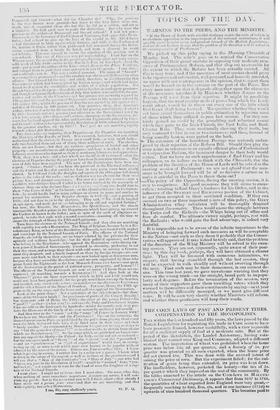rf01. 1 ICS OF TH E DAY.
WARNING TO THE PEERS, AND THE MINISTRY.
" If the !louse of Lords with link:410 obstinacy resists the ends of refia no in an obstinate opposition to the improvement of the national institutions, it will sJei dily ecaSt to C.riSt usitO independent branch ,ff the _British Leyiilatare; end we do not hesitale to sari, that the problem of its duration will Le so/red tie ensuing sess:on of Parliament."
easy to conjecttire. All good measures they will strive to emas- culate ; trusting to Earl (lime's fondness fur his Order, and to the influence of the STANLEY and RICHMOND portion of the Cabinet, to get them accepted in their mutilated condition. If they can succeed on two or three important points of this policy, the GREY Administration (they calculate) will be thoroughly despised throughout„t he country. Then would ensue the struggle between the Tories and the Radicals—the Whigs being out of otlice and hors de combat. The ultimate victory might, perhaps, rest with the Radicals : who would gain the first advantage, is indeed very doubtful.
It is impossible not to be aware of the infinite importance to the Ministry of bringing forward such measures as will be acceptable to the Nation—not such as they deem it probable that the Conser- vatives will approve of. It may indeed be truly said, that the problem of the duration of the Whig Ministry will be solved in the ensu- ing session. They are not, apparently, quite aware of their posi- tion : by this day week, perhaps, they will have obtained a clearer light. They will be favoured with numerous intimations, we suspect, that having scrambled through the last session, they will be expected to walk steadily and without swerving through the next. That such may be their demeanour, is our earnest de- sire. This time last year, we gave unwelcome warning that they were on the wrong track—on the straight, broad path to unpopu- larity and disgrace. Before the termination of the session, very many of their supporters gave them unwilling votes; which they excused to thennelves and their constituents by saying—next year matters will be differently managed, or we must give different votes. It will be seen very shortly whether Ministers will reform, and whether these gentlemen will keep their words. We pieked up this pithy saying in the Morning Chronicle of Monday last. The artie!e goes on to remind the Conservative Opposition of their grand mistake in opposing very moderate mea- SMeS of Parliamentary Reform, and that they are answerable for the extent to which the Reform has been actually carried. All this is very true; anal if the measures of next session should prove to be vigorous and substantial, well prepared and honestly intended, we agree with our contemporary in the opinion, that to reject them would be hazard ;us in the extreme on the part of the Peers. But every man must see that it depends altogether upon the character of the measures int...educ, d by Ministers whether danger to the Rerage will a.i us from their rejection. It might by possibility happen, that the most popular mode of proceeding which the Liras could adopt, would be to throw out eveiy One of the ;bills which Earl Cum- shall britig toward. We question whether they would not have raised I Lemselves in public estimation by rtjeeting most of those whieli they suffered to pass last session. For they cer- tainly gained no credit by the grumbling and reluctant assent which they gave to the Irish Church, this East India, and Bank Charter Bills. They were continually showing their teeth, but only ventured ti bite ia one or two instances: and then, instead of being soundly beaten, were patted on the back. The existence of the hereditary Peerage was seriously endan- gered by their rejection of the Reform Rill. Should they play the same game in reference to an equally efficient plan of Ecclesiastical or Corporation Reform, the imminent danger to their body would return. But we have no such apprehension ef Earl GREY and his colleagues, as to induce us to think with the Chronicle, that the problem of the duration of the House of Lords will be solved in the ensuing session of Parliament : we are not afraid that the mea- sures to be brought forward will be of so decisive a nature as to make it suicidal in the Peers to throw them out !
WII0 IleelareS Carlist is for better reeeivoal by the monopole of L---The policy is


















 Previous page
Previous page